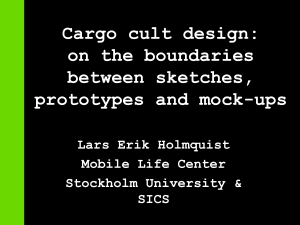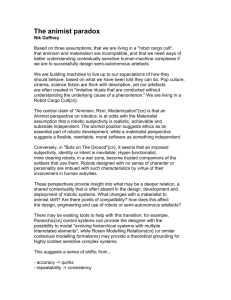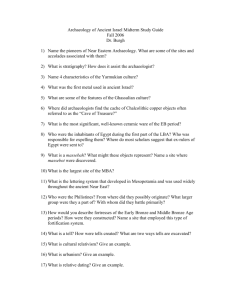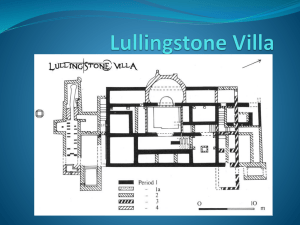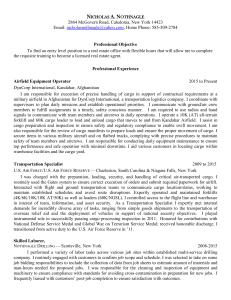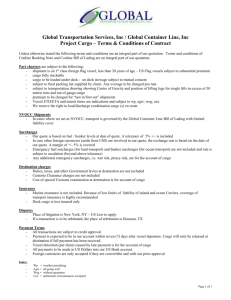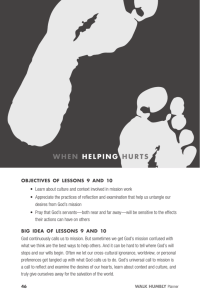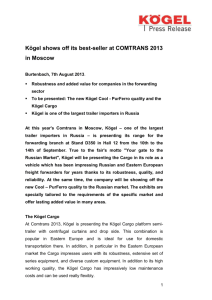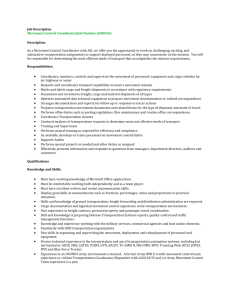Perpetuating the cargo cult
advertisement
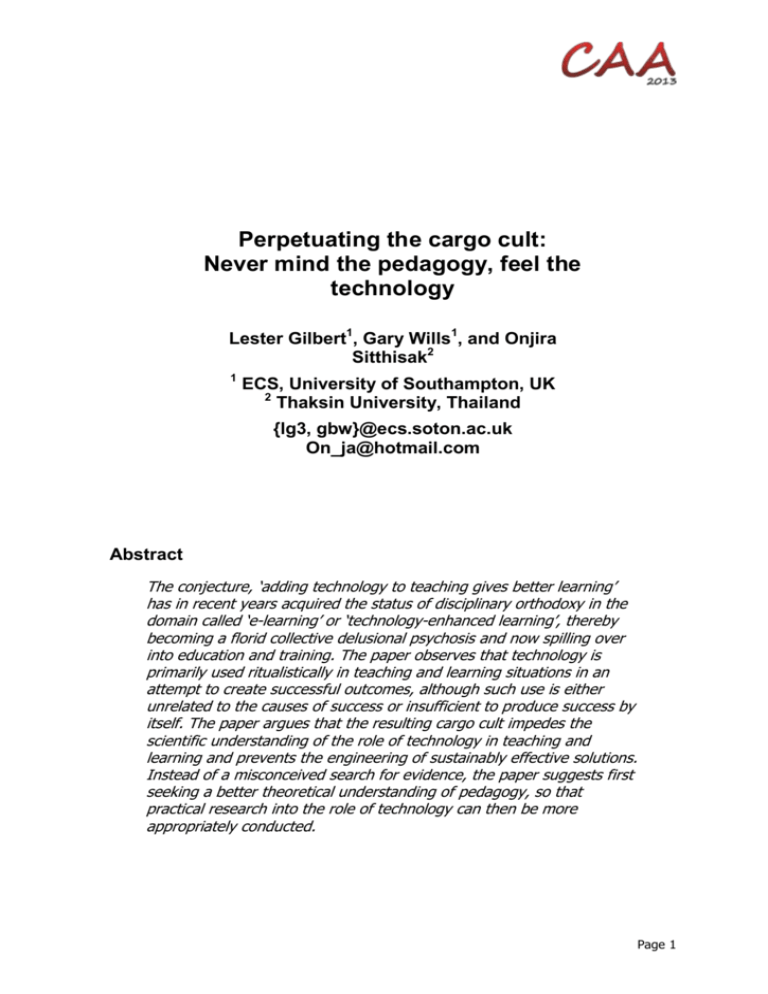
Perpetuating the cargo cult:
Never mind the pedagogy, feel the
technology
Lester Gilbert1, Gary Wills1, and Onjira
Sitthisak2
1
ECS, University of Southampton, UK
2
Thaksin University, Thailand
{lg3, gbw}@ecs.soton.ac.uk
On_ja@hotmail.com
Abstract
The conjecture, ‘adding technology to teaching gives better learning’
has in recent years acquired the status of disciplinary orthodoxy in the
domain called ‘e-learning’ or ‘technology-enhanced learning’, thereby
becoming a florid collective delusional psychosis and now spilling over
into education and training. The paper observes that technology is
primarily used ritualistically in teaching and learning situations in an
attempt to create successful outcomes, although such use is either
unrelated to the causes of success or insufficient to produce success by
itself. The paper argues that the resulting cargo cult impedes the
scientific understanding of the role of technology in teaching and
learning and prevents the engineering of sustainably effective solutions.
Instead of a misconceived search for evidence, the paper suggests first
seeking a better theoretical understanding of pedagogy, so that
practical research into the role of technology can then be more
appropriately conducted.
Page 1
Perpetuating the cargo cult
The modern age has given us a reasonably good (though not always successful) working
hypothesis:
‘X’ plus technology better ‘X’
Actually, not just the modern age. An argument can be made that civilisations rise in
succession largely because of successively superior technologies (Diamond, 1997), though
curiously civilisations fall in succession due to a wider variety of causes (Diamond, 2005).
A more cynical view is that what might be meant by ‘better’ in the process of
technological innovation is motivated mainly by laziness (Simpson, 2013).
The ‘e-Learning Conjecture’
The conjecture, ‘adding technology to teaching gives better learning’ has in recent years
acquired the status of disciplinary orthodoxy in the domain called ‘e-learning’ or
‘technology-enhanced learning’. This orthodoxy is now spilling over into education and
training more generally, and constitutes a florid collective delusional psychosis about the
value and benefit of technology in education. Florid, because it is so overt; collective
because it is exhibited by the e-learning and technology-enhanced learning communities
and their associates; psychosis because the beliefs are not grounded in reality; and
delusional since this is identified as the specific nature of the psychosis.
A malformed syllogism
‘Teaching’ plus technology better ‘Learning’
‘X’ plus technology better ‘Y’
The e-Learning Conjecture is malformed as a syllogism; its structure is ‘X’ plus technology
better ‘Y’, where ‘X’=Teaching, and ‘Y’=Learning. Positing such a conjecture conflates
‘teaching’ with ‘learning’.
While this paper focuses upon characterising this delusional psychosis and suggesting a
treatment, there may be some value in first touching upon some of its possible causes.
Postmodern Humpty Dumpty academics
JG Ballard has often commented upon the influence and effect of marketing and
advertising upon our perception and conception of the world and what is important within
it (Ballard, 2012). Part of this influence comes from the use of words for their connotation
and emotional impact rather than from any particular regard to their defined meaning or
to the rational logic of the assertions being made.
This is a reflection of the more general Postmodernism movement. According to
Wikipedia:
Walter Truett Anderson identifies Postmodernism as one of four typological world
views. These four world views are the Postmodern-ironist, which sees truth as
socially constructed; the scientific-rational, in which truth is found through
Page 2
Perpetuating the cargo cult
methodical, disciplined inquiry; the social-traditional, in which truth is found in the
heritage of […] civilization; and the neo-romantic, in which truth is found through
attaining harmony with nature and/or spiritual exploration of the inner self1.
Where truth is regarded as constructed, academics are free to posit and then seriously
investigate constructions such as ‘learning objects’ and the ‘transmission of knowledge’
which in normal discourse are meaningless or, worse, misleading.
Strictly, there are no learning objects and knowledge cannot be transmitted; instead, we
have teaching objects and the transmission of information. However, by virtue of the
historical and on-going actions and activities of the communities of practice associated
with e-learning and technology-enhanced learning, we understand that ‘learning objects’
is shorthand for ‘electronic materials to support teaching and learning’, and hence, like
Humpty Dumpty (Carroll, 1871) we have phrases which mean anything we wish them to
mean.
“When I use a word,” Humpty Dumpty said, in rather a scornful tone, “it means
just what I choose it to mean — neither more nor less.”
Politically correct academics
In the case of ‘Teaching’ plus technology better ‘Teaching’, an entirely defensible
position, somehow ‘teaching’ has become disreputable, and ‘learning’ the only acceptable
word to use. This derives from a desire for political correctness, hence we currently
espouse ‘Teaching’ plus technology better ‘Learning’. For some years now, the
backlash against teaching has sought to place the learner at the centre of the teaching
and learning situation. It is now politically incorrect (and professionally suicidal) to
propose projects which are called teaching projects, construct environments which are
teaching environments, or develop materials which are teaching materials.
“Over the last decade […] there has been a paradigm shift, at least in the
espoused rhetoric of higher education, from a focus on teaching to a focus on
learning” (Rust, 2002).
Rust (2002) quotes Angelo,
“We continue to assess student learning – and to graduate and certify students –
much as we did in 1986, 1966, or 1946, without meaningful reference to what
students should demonstrably know and be able to do”
Rhetoric and ideology continue to guide academic endeavour.
‘New’ is not ‘innovative’
Another part of the influence of marketing is the emphasis upon ‘new’ and the conflation
of ‘new’ with ‘innovative’ and with ‘valuable’. The effect is that managers and role models
suggest that teachers and trainers should seek ‘innovation’, that is, the deployment of
technology in their teaching and training. The effect is the increasing provision of teaching
development courses and workshops with titles such as, “Using the iPad in lectures” and
“How to convert your course to a MOOC”, and of conferences with titles such as,
“Innovative learning”.
There is a line of thought which seeks some form of ecological validity by aligning
students’ learning experiences with their everyday experiences. This idea can be seen in
1
http://en.wikipedia.org/wiki/Post_modernism
Page 3
Perpetuating the cargo cult
the debate around Prensky’s (2001) ‘digital natives’. The effect is to encourage the notion
that, since many children use Wiis, Nintendos, or Playstations for hours at a time playing
games with remarkable dedication and motivation, they should be educated using such
hardware and with similar software.
Cargo cult science
In a famous passage, Feynman attacked certain educational theories:
I found things that even more people believe, such as that we have some
knowledge of how to educate. There are big schools of reading methods and
mathematics methods, and so forth, but if you notice, you'll see the reading scores
keep going down--or hardly going up--in spite of the fact that we continually use
these same people to improve the methods. There's a witch doctor remedy that
doesn't work. [This is an] example of what I would like to call cargo cult science.
(Feynman, 1985)
Cargo cults refer to post-World-War II Melanesian movements whose members believe
“that various ritualistic acts will lead to a bestowing of material wealth”2.
In attempts to get cargo to fall by parachute or land in planes or ships again,
islanders imitated the same practices they had seen the soldiers, sailors, and
airmen use. Cult behaviors usually involved mimicking the day to day activities and
dress styles of US soldiers, such as performing parade ground drills with wooden
or salvaged rifles. The islanders carved headphones from wood and wore them
while sitting in fabricated control towers. They waved the landing signals while
standing on the runways.
Any sufficiently advanced technology is indistinguishable from magic (Clarke, 1962). For
the purpose of this paper, cargo cult science is a science with no effective understanding
of how a domain works. The symptoms of such a science are the use of words within a
community to mean whatever seems useful at the time, and the ritualistic adoption of
practices with no rational basis for expecting them to be effective.
These considerations underpin the descriptive phrase ‘florid collective delusional
psychosis’ for the currently received orthodoxy, ‘teaching’ plus technology better
‘learning’.
Seeking evidence
Others have, of course, articulated similar concerns, though perhaps not so forcefully. The
currently received solution to the patchy success of initiatives in technology-enhanced
learning is to seek evidence. We have a Webinar series, “What the research says”. We
have ourselves authored reports seeking to synthesise the evidence for technology
enhanced assessment and feedback (eg, Gilbert, Whitelock & Gale, 2011).
An influential report on what the research says (Lemke, Coughlin & Reifsneider, 2009)
summarises one view:
“The reality is that advocates have over-promised the ability of education to
extract a learning return on technology investments in schools”
Seeking evidence is what Kuhn (1962) has characterised as ‘normal science’. Such science
seeks to grow and develop by typically following the empiricism inherent in Popperian
2
http://en.wikipedia.org/wiki/Cargo_cult
Page 4
Perpetuating the cargo cult
‘conjectures and refutations’ (Popper, 1963). The problem for Kuhn, and especially
Feyerbend (1975), is that normal science cannot effectively grow when based upon
inadequate theory, and that neither an empiricist or inductivist approach to science can
succeed. For Kuhn, a revolution is needed. For Feynman, the lack of effective educational
understanding is a lack of theory, not a lack of evidence or better practice. For
Feyerabend, the necessary revolution is theoretic and not evidential.
Perpetuating the cargo cult
The position of this paper is that the use of educational technology currently constitutes a
cargo cult, in that technologists and associates with no effective theory of pedagogy
ritualistically deploy technology in teaching and learning situations with no more than
well-intentioned hope of successful outcomes. It is in the nature of magical activities that
this sometimes works and sometimes does not…
A better theoretical understanding
The proposed ‘solution’ is not the further collection of evidence. Instead, we propose a
theoretical view of the teaching and learning situation which better identifies the role of
technology. Of course, this is simply a working theory and, pace Kuhn, can never be
definitive. The point, however, is that it is necessary to secure a theoretical position which
better locates technology in pedagogy before re-launching the search for evidence.
A conceptual model of teaching and learning
The conceptual model of Figure 1 shows that teaching and learning activities use an
environment and associated services.
Figure 1 Conceptual model of teaching and learning
Page 5
Perpetuating the cargo cult
The conceptual model is entirely consistent with IMS Learning Design (IMS GLC, 2003),
and seeks to extend this standard by making explicit the pedagogically relevant data
required by teaching activities as distinct from and in addition to learning activities.
It should be clear that, of all the components in this conceptual model, it is the
environment and associated services which are based upon technology. All other
components exploit the environment and associated services, but are not themselves
technological.
An ontological model of teaching and learning
The ontological model of Figure 2 supports the conceptual model and shows that it is the
task of the teacher to set up an environment and associated services which support
teaching and learning activities.
Figure 2 Ontological model of teaching and learning
It should be clear that it is the environment and associated services which are based upon
technology. All other components exploit the environment and associated services, but
are not themselves technological.
Application to e-assessment
The conceptual and ontological models of Figure 1 and Figure 2 are focused on pedagogy
– teaching and learning – and they identify feedback as the key driver of learning.
Assessments are usefully categorised as summative or formative, and one definition of
formative assessment is any assessment which provides feedback to students about their
learning (Irons, 2008). Summative assessment in general does not provide feedback and
is not designed to provide feedback. The models thus show that summative assessment
Page 6
Perpetuating the cargo cult
has negligible pedagogic value, though it has obvious value in relation to matters such as
educational management, quality management, certification, qualification, service
delivery, programme evaluation, and so on. While the use of technology to support
summative assessment is extensive and largely both appropriate and effective for
educational management, the models tell us that technology-enhanced summative
assessment is unlikely to be pedagogically appropriate, effective, or relevant.
The models characterise an item of formative assessment as an “ask”, that is, as a
teaching activity where the agent undertaking the teaching role (which can be a student
engaged in self-study) asks a question of the student or asks the student to undertake a
learning activity. The result of an “ask”, the result of the asked-for learning activity, is a
student-constructed artefact which the teaching agent then judges so as to provide
feedback. The feedback is contingent upon the learning activity, is appropriate to the
intended learning outcome, and hence is designed to support student learning, so
achieving the “constructive alignment” proposed by Biggs and Tang (2011).
The models make clear that feedback is “teaching feedback”, that is, is provided by an
agent undertaking the teacher role when judging the result of a learning activity. The
models also make clear that effective feedback derives from the intended learning
outcomes. Feedback is not somehow an inherent component of the learning activity, and
does not somehow necessarily follow when a student undertakes a learning activity.
Additionally, the models show that the learning activity is an activity of some kind, that is,
it requires the student to do something that results in an artefact which is in turn judged
by the teaching agent.
References
Ballard, JG (2012). Extreme Metaphors. Fourth Estate (Harper).
Biggs, J & Tang, C (2011). Teaching for Quality Learning at University. McGraw-Hill.
Carroll, L (Charles Lutwidge Dodgson) (1871). Through the Looking-Glass. Penguin
Classics; New Edition 2007.
Clarke, AC (1962, rev. 1973). Hazards of Prophecy: The Failure of Imagination in Profiles
of the Future: An Enquiry into the Limits of the Possible. Gollancz.
Diamond, J (1997). Guns, Germs, Steel. Chatto & Windus.
Diamond, J (2005). Collapse. Allen Lane.
Feyerabend, P (1975). Against Method: Outline of an Anarchistic Theory of Knowledge.
Humanities Press.
Feynman, R (1985). Cargo cult science. In, Surely You're Joking, Mr. Feynman! W W
Norton.
IMS GLC (2003). Learning Design. http://www.imsglobal.org/learningdesign/
Irons, A (2008). Enhgancing Learning Though Formative Assessment and Feedback.
Routledge.
Gilbert, L, Whitelock, D, and Gale, V (2011). Synthesis report on assessment and
feedback with technology enhancement. HEA.
Kuhn, TS (1962). The Structure of Scientific Revolutions. University of Chicago Press.
Page 7
Perpetuating the cargo cult
Lemke, C, Coughlin, E, and Reifsneider, D (2009). Technology in schools: What the
research says: An update. Culver City, CA: Commissioned by Cisco.
http://www.cisco.com/web/strategy/docs/education/tech_in_schools_what_research_s
ays.pdf
Popper, K (1963). Conjectures and Refutations: The Growth of Scientific Knowledge.
Routledge.
Prensky, M (2001). Digital natives, digital immigrants. On the Horizon, NCB University
Press, 9(5).
Rust, C (2002). The Impact of Assessment on Student Learning. Active Learning in Higher
Education, 3:145.
Simpson, G (2013). http://www.ultrasomething.com/photography/2012/12/a-fetishistsguide-to-the-monochrom-part3/
Page 8
